PICKERINGTON, Ohio — For years, Sharon Kitchen and her husband, Mike, went to the same pharmacy just 2 miles from their house in this suburb of Columbus. But last June, their pharmacist, Nate Hux, suggested that Sharon switch to a new pharmacy he had opened — right next door to his old one — which he said would save her more than $500 a year.
Hux has owned Pickerington Pharmacy, which takes nearly every kind of insurance, since 2016. In 2020, he launched Freedom Pharmacy, a separate business with an unusual model: It’s a pharmacy that takes no insurance, instead selling generic medications at wholesale prices, plus a small markup that goes to the pharmacy.
“At first I thought, ‘How do they do this?” Kitchen said. “But it turns out, if I go through my insurance, it’s going to be a higher cost for me.”
Freedom Pharmacy is one of a small but growing number of “cash” or “self-pay” pharmacies, sometimes able to save customers hundreds of dollars on a single medication. As patients struggle with rising prescription drug prices and insurance deductibles, everyone from members of Congress to entrepreneurs like Mark Cuban and small-business owners like Hux are trying to lower drug costs. By opting out of the insurance system altogether, Hux and other cash pharmacy owners are able to avoid many of the fees and rules that inflate medication prices. Consumers say they are reaping the benefits.
While 91% of prescriptions in the U.S. are filled through insurance, according to the health care data analytics and consulting firm Avalere Health, pharmacists like Hux are betting that the savings and service they can offer outside that system will draw enough customers to make their experiments a success.
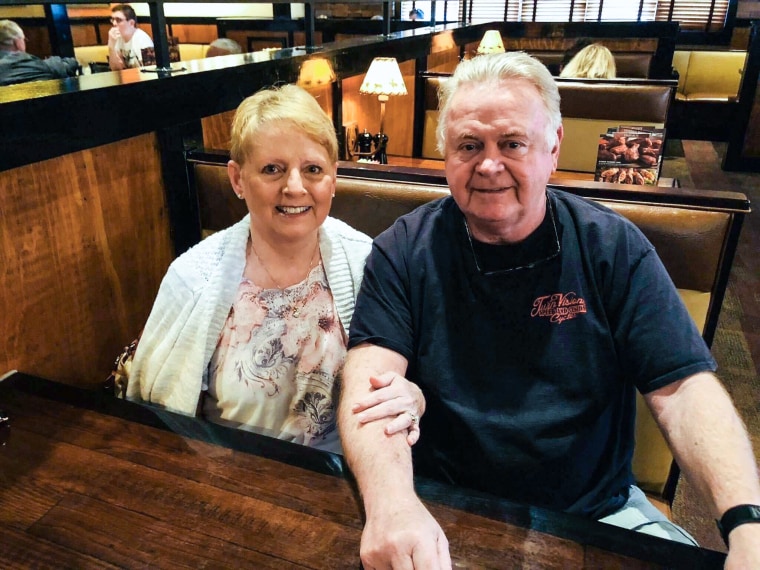
So far, it’s been working, said Hux, who regularly advises patients which of his two side-by-side pharmacies will be the best place to fill their prescriptions. Pickerington is still the more profitable of the two pharmacies, but the gap is closing and if the trend continues, he said, all-cash Freedom will eventually overtake it.
For some drugs, especially name-brand medications without generic alternatives, the insurance pharmacy, Pickerington, will most likely be the better bet. For other drugs, particularly those that have recently gone generic, it will be the all-cash pharmacy, Freedom.
“For about 25% of people, it makes more sense to fill at Freedom,” said Hux. “If I didn’t own both I wouldn’t know. … As I’m processing claims, one of the best things that I can see is which world is best for my patient. Is it the insurance world? Or is it the noninsurance world?”
For Kitchen, a retired registered nurse with arthritis and fibromyalgia, it was the noninsurance world of Freedom Pharmacy. Her eight medications were far cheaper there. One, which cost $141 for a three-month supply with insurance, was just $23.40 without it. But her husband’s handful of prescriptions are still cheaper at Pickerington.
Hux’s ability to compare the prices at his two storefronts was extremely helpful, Kitchen said, as trying to shop around as a patient is “overwhelming.”
“I feel very fortunate,” she said. “Not every community is going to have this kind of pharmacy. … We’re senior citizens on fixed incomes, so we try to look for savings wherever we can. And it’s the same medication, whether I get it at Freedom or at Pickerington.”
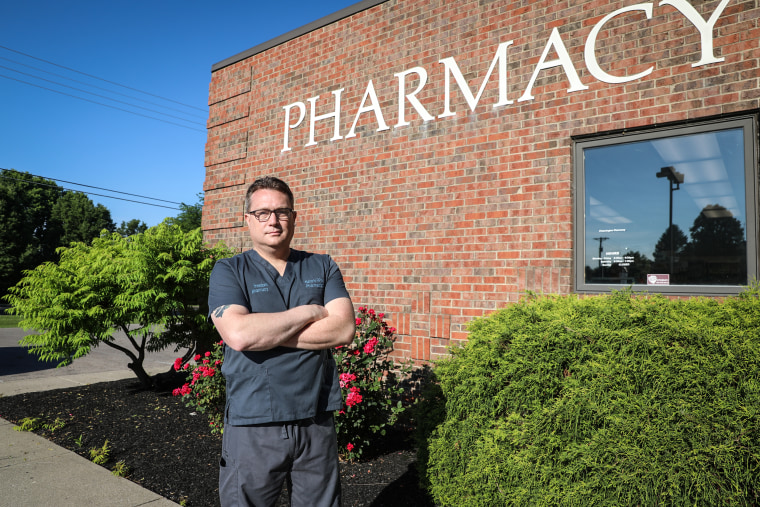
‘The antithesis’
Cash pharmacies typically sell generic drugs at the price they pay for them, plus a small markup or membership fee. Those are classic retail business models, but they’re rarely seen in health care.
“What’s old is new. Decades ago, patients were the customer at the pharmacy,” said Antonio Ciaccia, president of 3 Axis Advisors, a research consulting company that studies drug pricing, and whose clients include Mark Cuban’s CostPlus Pharmacy. “Today, the customer at the pharmacy is the insurance company.”
“Right now, we have a system that is completely predicated upon artificially inflated drug prices,” he said. “What cash pharmacies offer is the opposite — the antithesis. It’s a return to retail fundamentals.”
In the past few years, cash pharmacies have popped up around the country, from Pittsburgh to Burns, Oregon. Cuban’s online CostPlus Pharmacy, which does not take insurance, is one of several such startups to enter the market recently.
Larger companies like Walmart have offered their own generic prescription drug programs as cost-saving insurance alternatives for years. Prescription discount card providers like GoodRx are another model intended to help consumers navigate the drug pricing system and save money.
But cash pharmacies still make up a tiny portion of the market, and most Americans are unlikely to have one in their community. Approximately 5% of retail prescriptions are filled using discount card programs like GoodRx, according to Avalere.
And for more than a decade, prescription drug costs have been rising, while pharmacy profit margins have shrunk, straining both patients’ pocketbooks and pharmacy bottom lines.
Much of the control over drug pricing rests with pharmacy benefit managers, powerful middlemen who handle prescription benefits for insurance companies. Their opaque pricing methods, fees and rules have been repeatedly scrutinized, and are the subject of a Federal Trade Commission inquiry opened this summer into the companies’ business practices, from how they structure drug manufacturer rebates to their lists of covered medications.
“Our job is to drive down costs on behalf of the consumer and those paying the bill for health insurance,” said JC Scott, president of the Pharmaceutical Care Management Association, the trade group that represents pharmacy benefit managers (PBMs). “Without us, there’s nothing standing between the consumer and the … drivers of high drug costs. I’m confident that once the FTC digs in and understands that, they’ll reach that same conclusion.”
Pharmacists and patient advocates have been pushing for regulatory action against these middlemen and their business practices for years, saying the pharmacy payment model is “broken” and puts patient safety at risk.
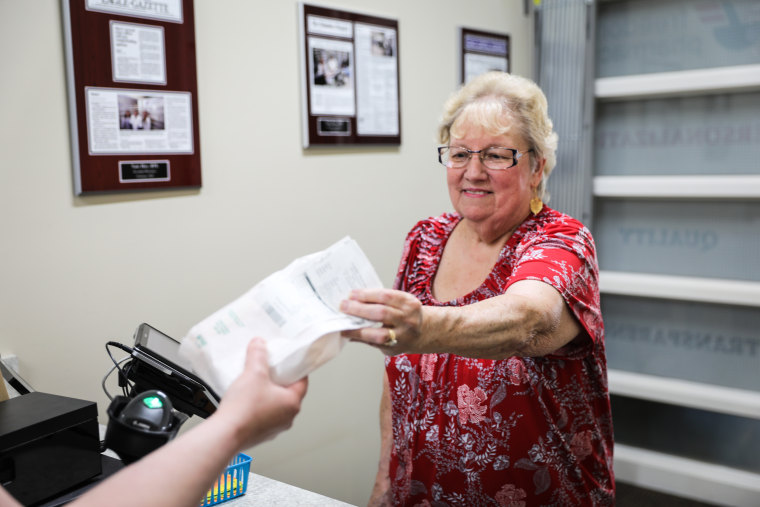
“An over-consolidated PBM industry is squeezing out the resources pharmacists need to provide a high level of care and access for patients,” said Ilisa Bernstein, interim CEO of the American Pharmacist Association, adding that she is “encouraged” to see pharmacists “taking back control of their practices” by moving outside that model.
High drug prices are the fault of pharmaceutical manufacturers, not insurance companies and pharmacy benefit managers, said Scott and his counterparts at AHIP, the trade group representing health insurance companies. But according to PhRMA, the trade group that represents drug manufacturers, it is pharmacy benefit managers and insurers who determine the price patients ultimately pay, and who often do not pass on the billions of dollars in savings to consumers from rebates provided by drugmakers.
There are national and state-level efforts by legislators and regulators to bring drug prices down and rein in middlemen, including recent action by the Centers for Medicare and Medicaid Services and the Ohio attorney general, and there is proposed legislation in Congress. Systemic change, however, is slow going. For now, the best advice for patients, according to drug pricing experts like Ciaccia, is to shop around to figure out what makes the most sense for their particular needs.
Overinflated
The cost savings for customers at cash pharmacies can be eye-popping, depending on their specific medications and insurance plan benefits. One Freedom Pharmacy customer who lives in Florida but frequently travels to the Columbus area for work recently began taking a generic form of Tecfidera, a multiple sclerosis medication. His pharmacy told him the prescription would cost $650 per month. Hesitant to essentially be “paying rent for another apartment I can’t use,” he said he began looking for cheaper options, including contacting Freedom Pharmacy ahead of his next business trip.
He reached Hux, who told him that he could pick up a three-month supply of the medication for $85.
“I didn’t even think that was possible,” recalled the customer, who asked that his name not be used because his employer was unaware of his diagnosis. “I called him multiple times asking, ‘Are you sure that’s what the price is?’ And he said, ‘Yes, that’s the price I’m telling you, because that’s what I paid for it.’”
After boarding a flight home in May with three bottles of medication and a wallet only $84.55 lighter, the customer said he plans to become a regular. “Fortunately my work requires me to go to Ohio quite a bit. But if work doesn’t send me, then I can make a trip on my own. Even then it will be cheaper.” He’s already booked his next flight.
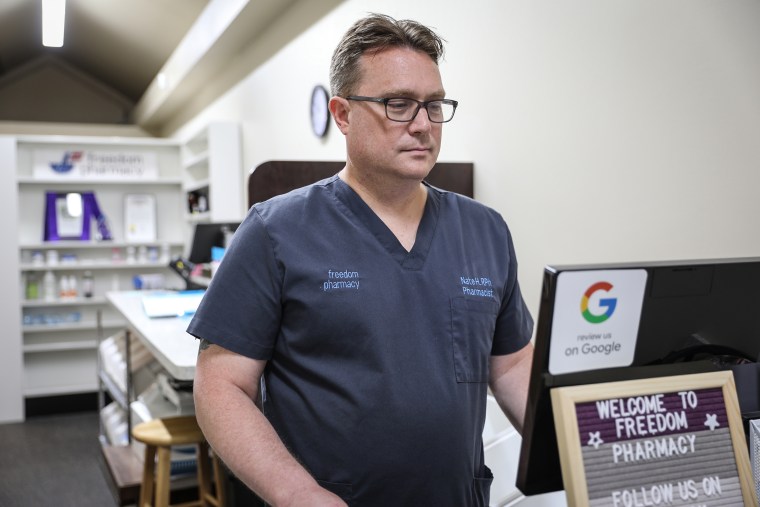
It’s for medications like the Florida man’s that a cash pharmacy may be most useful, said Ciaccia, the drug pricing analyst. The cost difference was so great for his MS drug because its patent had recently expired, generics had become available, and the pharmacists purchase price had plummeted.
“Typically, what we see is that the drugs that are the most overinflated are the ones that are most recent to market on the generic side,” Ciaccia said. This happens because generic medications are overall cheap to make, so when a drug loses its patent, the cost for a pharmacy to purchase it can fall dramatically. But those savings often are not immediately passed on to patients in the insurance-based system.
“We see mental health medications, we see opioid treatments, and we see cancer medications that tend to be the most overinflated in the marketplace,” Ciaccia said. “Insulin would also fall into that category.”
Hux regularly sees such price differences between his two pharmacies. Medications like generic Abilify and generic Celebrex — a medication Kitchen, the retired nurse, takes — are often hundreds of dollars cheaper at Freedom than Pickerington, he said. The same is true of erectile dysfunction medications.
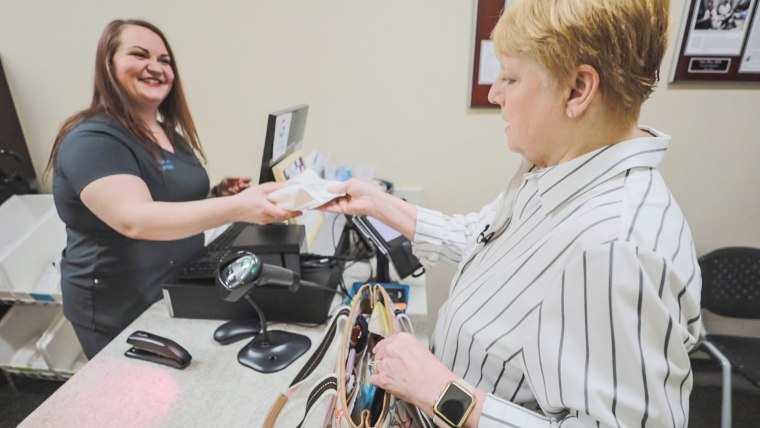
“Generic Viagra and generic Cialis, those types of things, are way more expensive inside the system than just doing self-pay pharmacy,” he said. He rarely sees them well-covered by insurance. “Those would be $1,000 for a 30-day supply, maybe. And here, they’re about $15 for a 30-day supply.”
Working with insurance is expensive, said Hux. The various fees, rules and processing time that come with accepting insurance affect how pharmacies like Pickerington operate, and push up labor costs. It takes more staff as well. Hux typically has one to two people working at Freedom daily and three to four at Pickerington.
“We have to pass all those costs on to the consumer,” he said. By cutting out the middlemen, Freedom Pharmacy is far cheaper to operate. “It’s just between the consumer, me and the doctor. It makes us much more efficient, it gives better outcomes, and it’s less expensive.”
The benefits of Hux’s model go beyond just the price, said Candice Casto, who picks up medications for herself and her husband at Freedom and for her handicapped father at Pickerington.
“You have these two different options depending on what you actually need,” she said. She and her husband are on high-deductible insurance plans that don’t cover much of their prescriptions below the deductible, but her father is on Medicare and takes several medications that do not have cheaper generic options.
The service is also more nimble and personalized, she said. When Casto’s doctor instructed her to skip the placebo week of her birth control pills and go right into the next month’s pack, she found she was unable to fill them more frequently than one month at a time, according to her insurance benefits. There are no such rules at Freedom Pharmacy. She now picks up three-month supplies there for $57, though the medication was free back when she got it through insurance. But Casto said being able to follow her doctor’s instructions is more important to her than the savings.
To Hux, that decision is the greatest benefit he offers patients. At Freedom, “sometimes it’s less cost, sometimes maybe a little bit more. But at least they have a choice. They know exactly what the price is upfront,” he said. “When consumers have choices, it’s good for everyone.”
Kenzi Abou-Sabe and Vicky Nguyen reported from Pickerington, Ohio, and Adiel Kaplan from New York City.
This article originally appeared on NBC News.